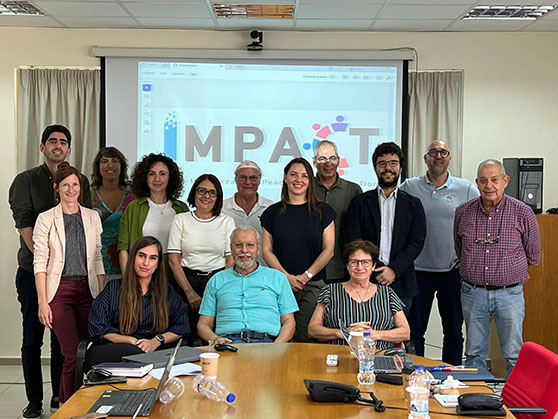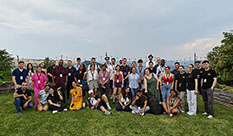More:
News & Stories
HIT takes part in international academic initiatives.
An interview with the Vice-Rector for International Affairs at HMU University in Crete, Greece, Dr. Konstantinos Petridis, who heads the IMPACT project at the Hellenic Mediterranean University, Greece

In September 2023, the multinational and multicultural project IMPACT - International-Mediterranean Peace and Cooperation, was launched.
It is a consortium of higher education institutions, organizations, youth associations, and technology companies from Israel, Morocco, the Mediterranean basin countries, and Europe. It was successfully selected as part of the ERASMUS Virtual Exchange Program. In addition to the Israeli partners (HIT-Holon Institute of Technology, Gordon Academic College of Education, NICAT, and IUCC), several schools from Greece (HMU), Slovenia (UM), Italy (UTIU), and Morocco ( TF, UMP, AUI) are also involved.
Dr. Nava Shaked, Head of the School of Multidisciplinary Studies at HIT, led the project's implementation. Six months after the project started, we interviewed the project leader, Dr.. Petridis, vice-rector for international affairs at the Hellenic Mediterranean University (HMU), about the project, its significance, and its challenges.
"My collaboration with Dr. Shaked began several years ago, during the events of the 'International Week' 2017, and since then, it has only grown," says Dr. Petridis. "The project is aimed to encourage the students and lecturers in Europe and the Middle East, including Israel, to collaborate on various issues such as soft skills, mobility and more."
Dr. Petridis said that the initiative encountered difficulties at first, mainly from Muslim countries that refused to take part in the initiative because of Israel's participation.
"Academic institutions in Saudi Arabia and Jordan refused to take part, and it seemed that the university in Morocco was also against it, and only after I repeated again and again that the letter P in the initials of IMPACT represents the word PEACE they decided to comply and joined," said Dr. Petridis, adding that the "Israeli spirit" that HIT brought and the experience the School for Multidisciplinary Studies has, are only some of the reasons for adding HIT to the initiative.
As part of the project, a series of "Academy in War Zones" lectures was initiated in which researchers from countries that have experienced or are still experiencing security crises, such as Ukraine, Georgia, Armenia, and Israel, will also have a lecture in June about coping with learning and teaching during the war.
"As part of the school's work, we maintain extensive connections with several institutions in Europe and around the world, which are eager to learn the multidisciplinary teaching and work methods that we cultivate here," says Dr. Nava Shaked.
Dr. Hillel Eyal heads the international effort at the School of Multidisciplinary Studies. In the last two years, over six international courses and initiatives have been launched, such as joint BIP courses, expert workshops, and summer courses at European institutions, which are offered to all HIT students. The demand for courses is high, and this motivates us to continue working on the plan for next year. Despite the security situation, the school receives interesting offers for cooperation.
Understanding the importance of these collaborations, HIT and the Research and Internationalization Authority support the initiatives and assist in their implementation. "The international office at HIT supports the international initiatives of the researchers, especially within the framework of the Erasmus+ European Union funding program. This is an opportunity to take part in groundbreaking projects, guide policies, and maintain relations with the institutions of higher education in Europe," says Ira Ivshin Guetta, International Partnerships and Programs Manager at the institute.
HIT Holon Institute of Technology is proud to participate in the international effort with the participation of various academic institutions and research institutes worldwide. The institute maintains a system of collaborations with about 140 educational institutions in about 35 countries, which include student exchange programs, joint research, and mutual visits as part of international conferences.
- News & Events
International Week of Interdisciplinary Studies and Academic Collaborations in Crete
A substantial delegation of 16 students and four faculty members from HIT Holon Institute of Technology participated in week-long international activities and events at HMU-Hellenic Mediterranean University in Crete. ...


 Additional programs
Additional programs
